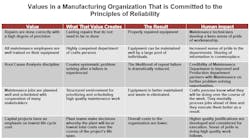If I had a dollar for every time I’ve heard a client say, “We’ve got to change the culture!” I would be a wealthy man.
The truth is that the culture has been created by the expectations communicated by an organization’s past and current leaders. So why is there such a mismatch between the behaviors managers observe in their plant each day and the behaviors they would like to see embedded in their work culture? What is creating this disparity between desired culture and actual culture?
The people calling for a changed culture are often experiencing the painful results of behaviors that are typical in reactive manufacturing organizations. And the results go beyond poor quality work, poor communication and production issues. The impact on the workforce goes even deeper, with workers feeling frustrated by work that’s not well organized or managed.
A manufacturing site undertaking a reliability implementation often requires what I would call a philosophical intervention. Behaviors exist that are damaging to the company, the plant and the individual. “Flavor-of-the-month” efforts to change how people work have failed. What’s required is to both identify problematic behaviors that are driving poor results, and dig deeper to confront the values and expectations that have shaped how people behave. When I am guiding a client on their reliability journey, one of my roles is to assess the existing philosophies shared by leaders at the site and help leaders create a new, shared value set that creates and sustains reliability in the organization.
The first chart, below, summarize the values, behaviors and results that I have observed in reactive manufacturing organizations. In contrast, the second chart shows the corresponding elements for a manufacturing organization that is committed to the principles of reliability. Carefully study the values and the implications of those values as they impact their people and reward systems.
How does an organization move from the values and results in the first chart to the values and results in the second chart?
The first step is revealing what the current values are and the impact they have on behaviors, production outcomes and employee morale. Once plant leaders understand the impact of current-state values, the need for change becomes very clear. In my experience in working with manufacturing leaders, simply exposing them to the two charts creates crystal-clear insight into how their shared value set is driving results and behaviors that are part of their current culture.
The second step is to identify the future mindset the organization is trying to create. Governing principles are the philosophical cornerstone for an organization that’s trying to become a highly reliable organization. Once established, they:
- Create tension between what they say and where they currently are
- Should be aligned with a set of KPIs that measure progress
- Guide decisions to be consistent with the governing principles
- Help to “connect the dots” with employees (new and existing) to help them see progress over multiple years
Here is an example of governing principles developed by a company that was on a reliability improvement journey and pursuing the benefits of a changed culture:
- Our reliability excellence program incorporates the company’s core values: safety, integrity, ownership, teamwork and excellence.
- Effective reliability excellence is driven by operations.
- Rx partnership agreements between functional groups are documented and implemented providing a solid foundation for reliability excellence.
- Sustainable, optimum equipment performance is achieved by following standardized work processes, practices and procedures and complying with planned work schedules.
- Job/role clarity is provided for all employees along with the associated training and skills development required to successfully accomplish assigned duties and responsibilities.
- Business decisions are based on facts and data in combination with life cycle costing analysis.
- Schedule compliance and process stability is valued above record setting.
- Symptomatic issues are resolved using root cause analytical methodology.
- We are a learning organization and use every opportunity to continuously improve our performance.
These governing principles were developed by the leadership team in the early part of their reliability journey. About four years later, they were experiencing significantly positive results and they elected to “double down” on the reliability efforts to generate more positive results even faster. The leaders chose to share these governing principles with their hourly workforce during the “doubling down” phase. They received a tremendous amount of feedback from their employees who had observed their leaders’ behaviors change over the years as they led from a different perspective as a result of their own philosophical intervention.
For organization leaders facing the need to change their culture, the first step should be to establish governing principles that drive the right values and behaviors.
Paul Borders, CMRP, a Principal Consultant for Life Cycle Engineering (LCE) and a Prosci-certified change management professional, has more than 20 years of experience as a strategic manufacturing manager. You can reach Paul at [email protected].
About the Author
Paul Borders
Paul Borders, CMRP, a principal consultant for Life Cycle Engineering (LCE) and a Prosci-certified change management professional, has more than 20 years experience as a strategic manufacturing manager. You can reach Paul at [email protected].

